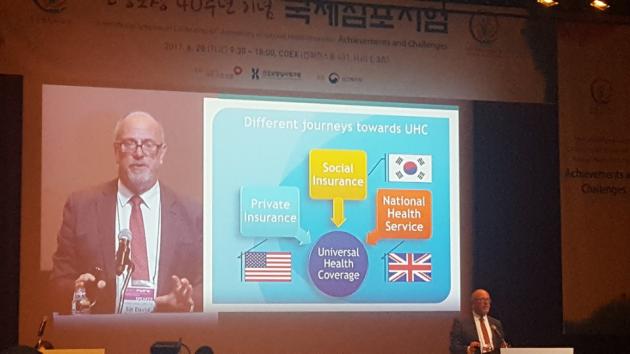The nation needs to reform the system for the future of health insurance by, for instance, reestablishing public health services and actively sustaining long-term conditions of primary care to patients, an expert said Tuesday.
Sir David Nicholson, former chief of the National Health Service (NHS) in the United Kingdom, made the proposal at an international symposium to celebrate the 40th anniversary of national health insurance held at COEX, southern Seoul.
“It’s not just the technical side how you deliver it, but what it means for the population,” he said. “To pay for insurance, people need to have confidence that it’s run appropriately and in the community to build nationhood.”

Nicholson, a professor at Imperial College London, also stressed that each part of the system must fulfill their responsibilities about quality, as well as working together in the interests of patients.
“An active system leadership with local accountability, flexible provider delivery models, aligned incentives and payment systems to enable strategies are needed to fulfill this,” he said. “This includes appropriate investments and the engagement of public and staff.”
Nicholson said he believes that the stronger the country’s economy is, the more money the society will spend for better healthcare.
"Large hospitals should not think of only the services they provide in their hospitals. We need to worry about the entire healthcare system," he added. "The leadership of hospital CEOs is essential.”
Moon Ok-ryun문옥륜, former head of the Graduate School of Public Health, Seoul National University, agreed on the need to introduce a system reform. He cited the case of Taiwan, currently rated as one of the best health insurance systems in the world, and its core is the introduction of a total contract system.
Moon noted the issue of national health insurance is insufficient regarding protection, unfair health insurance premium system, vulnerability to medical expenses, taxation on earned income, low birth rate and population aging, and increased demand for high-tech medical technology. He also presented several alternatives to solve this problem.
“The right way is to improve the exposed problems one by one rather than drastically altering the existing systems. It is the most conservative position, and its ripple effect will be containable,” Moon said.

